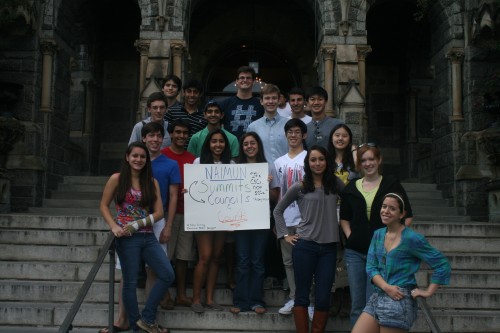This article is part of the NAIMUN Featured Series in preparation for NAIMUN 50 and was written by Neil Christy and David McManus.
It took us a long time to settle down on a name for the organ. We knew it had to have the words “Councils,” “Summits,” and “Court,” but it took us a long time to nail down the order, from both indecision and from trouble remembering whatever order with which we were currently fixed. That nice, solid “t”-sound at the end of “Court” ended up being the deciding factor–after all, there is just one court. “Councils, Summits, and Court” just sounds so punctual, so here we are. But who’s we? Neil Christy is a junior at Georgetown University studying Political Economy and minoring in Philosophy, and is serving as the Undersecratary General for Councils, Summits, and Court. He is assisted by his Deputy Undersecretary General, David McManus. David in a sophomore at Georgetown and is studying Government. CSCs offer delegates a chance to interact in committees which are larger than Cabinets, but offer a more personal, and more hands-on approach than Economic and Social Councils and General Assemblies. CSCs offer delegates a range of crisis involvement, from highly reactive crisis committees to more formal deliberative bodies, and allow delegates to specialize their interests to specific committees which are often small, but influential.
The committee of the International Criminal Court (ICC) is specializing in the practice of International Law. The committee will focus on the trial of the Sudanese President Bashir al-Assad. Delegates will simulate the proceedings of the court at The Hague, playing one of a variety of justices of the real ICC. This dramatic committee follows an original script put together by the committee’s staff to outline both sides of the argument for al-Assad’s incarceration. The newly robed justices will witness the arguments and the evidence and ultimately decide the fate of the Sudanese president.
The Next-11 and Brazil, Russia, India, China, and South Africa (BRICS) Committee will focus specifically on the issues of developing nations and their international negotiations and interactions. The 5 countries of BRICS are joined by Bangladesh, Eygpt, Indonesia, Iran, Mexico, Nigeria, Pakistan, the Philippines, Turkey, South Korea and Vietnam, who make up the N-11. Like the ICC, this committee steers away from crises in favor of a more formal, substantive debate of pressing development issues. Delegates will help decide how the rapidly developing countries will continue to grow economically and how to divide the spoils of that growth.
The Society of Muslim Brothers Committee is focused on a hypothetical summit of the highly influential and often notorious group in the Middle East and North Africa. Particularly since the Arab Spring and with the recent actions of the Egyptian President, who is a member of the Brotherhood, we felt that creating such a summit would be both topical and exciting. The committee will incorporate broad crisis themes connected to the Brotherhood’s modern challenges, but will also be focused on the greater organizational issues facing the Brotherhood.
The United Nations Security Council Council of 1963 Committee is meant to commemorate the Security Council at the time of the first NAIMUN in 1963. With the world in the throes of the Cold War, the committee will enable delegates to recreate the tensions and hopefully overcome the problems that would having been pressing to the first NAIMUN delegates fifty years ago. This committee will have moderate crisis involvement but also allow delegates to fully experience the historical context of their actions.
The current United Nations Security Council functions much the same as UNSC ‘63 would have fifty years ago. The committee will focus on the same current issues the real UNSC faces today. Additionally, the actions taken both in crisis and outside of crisis will serve to compare with those actions taken by the UNSC ‘63 committee, highlighting the historical shifts in interaction and negotiation.
The Pakistan National Security Council will give delegates the chance to serve as the some of the highest ranking officials within Pakistan. The committee will face fast paced crises focusing on some of Pakistan’s most prominent military threats. Additionally, the committee will highlight and discuss structural flaws and tensions within the Pakistani government.
Finally, the ExxonMobil Board of Directors committee will mimic the fast-paced crises of the Pakistan NSC. As a private entity, however, the structure of its debate and decision making will be tailored accordingly. The committee will discuss long range plans and models for success, while responding to the crisis situations that a modern multinational corporation faces daily.
We can’t wait to see all of our delegates during the NAIMUN weekend and to test their prowesses as skilled debaters. Delegates should come prepared to tackle the tough problems facing the world and to fight for the creative, effective solution. I hope you’re ready, because we are!


